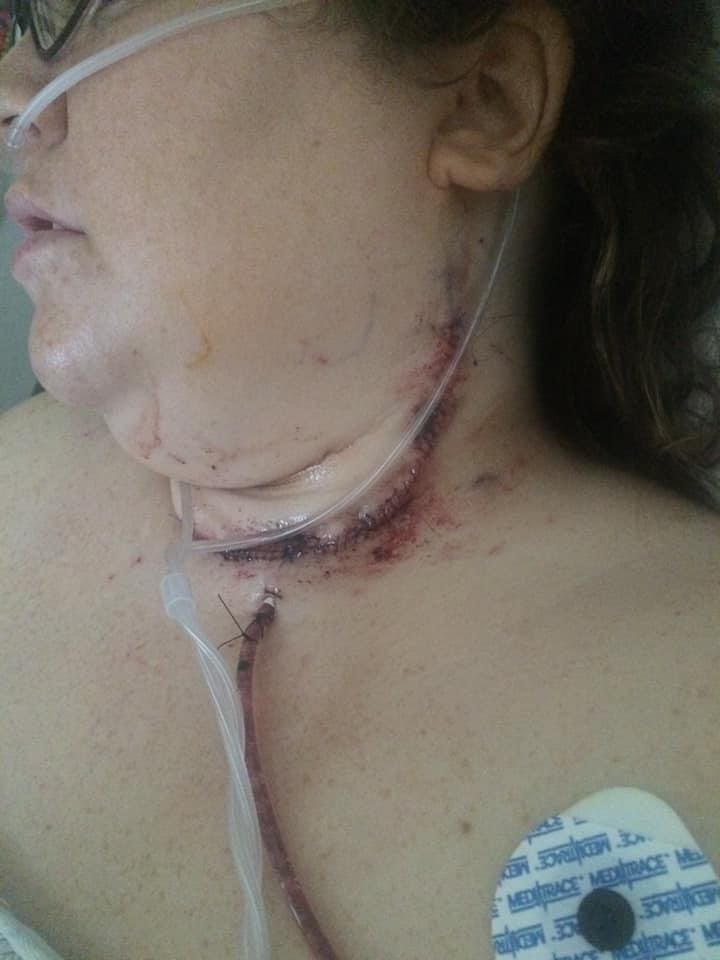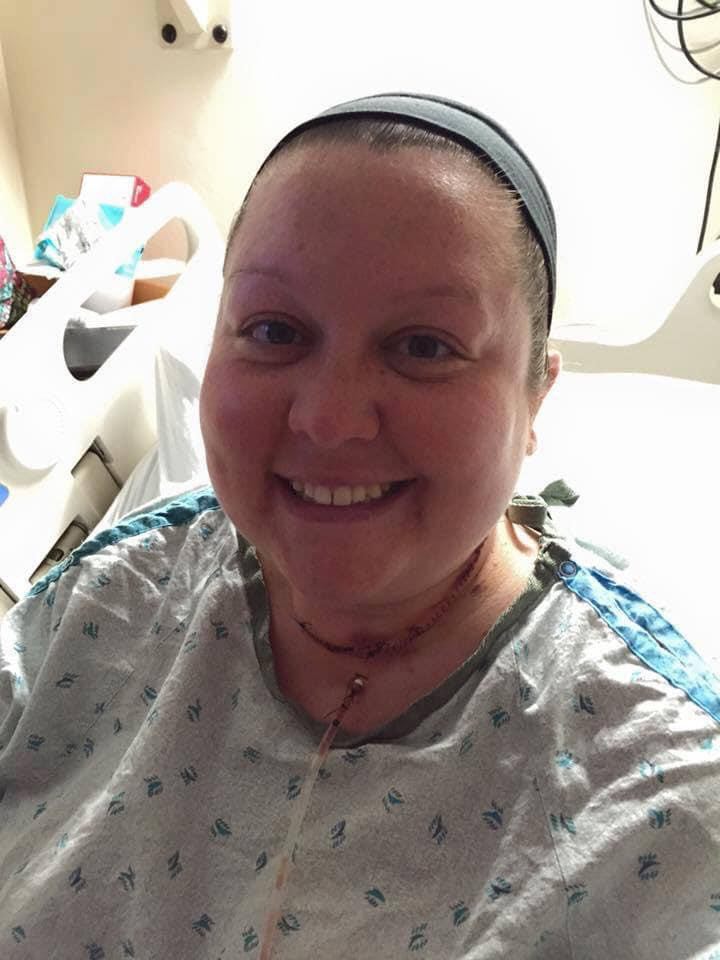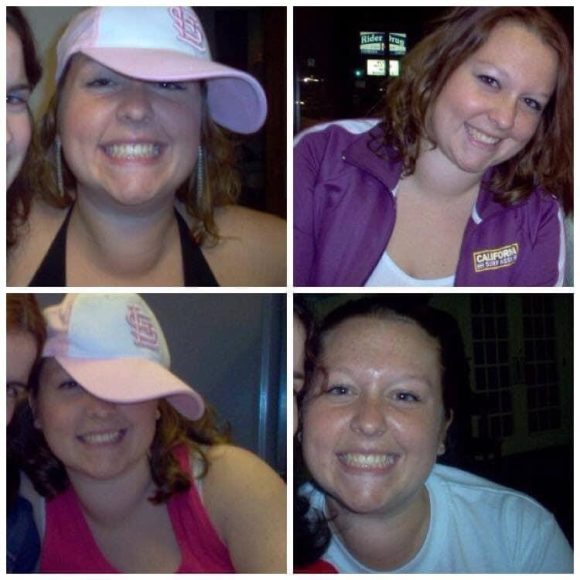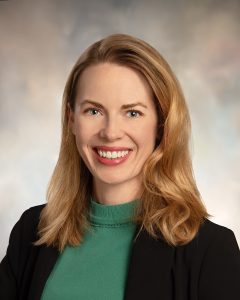Maddie, a single mom who lives in St. Louis, would love to say she is leading a normal life. But in so many respects, Maddie’s life has been extraordinary.
As a baby, she had pediatric leukemia and was cured. Then, as she entered college, a growth called a goiter appeared in her neck. An early biopsy showed it was benign, so she continued living life on her terms, receiving a full ride to Truman State University, then moving to Mexico and pursuing love. But the goiter continued to grow to the size of a peach, making even breathing and speaking difficult. During a return visit to St. Louis, Maddie and her parents sought help at an ENT clinic at Barnes-Jewish Hospital, where the head and neck surgery team, including Washington University physician Brian Nussenbaum, MD, saw the need for immediate intervention.
After her initial surgery, Maddie was diagnosed with thyroid cancer. She was 19. She continues receiving care within the newly established Robert Ebert and Greg Stubblefield Head and Neck Tumor Center at Siteman, the first and only dedicated head and neck tumor center in the country. Maddie recently told her incredible life story, sharing what it is like to balance motherhood and cancer, and described the nuance she brings to a normal life.


Can you share a little bit about your cancer diagnosis?
I have thyroid cancer and started treatment when I was 19. When people think of thyroid cancer, they think it’s easily treatable: you have surgery, you have to do maybe one round of radioactive iodine, and then you’re great for the rest of your life. You never have to think about it again. But that’s not me. I am in the small percentage of people with papillary thyroid cancer where my cancer has come back multiple times. I’ve had chronic cancer and have been going to Siteman for almost 20 years now. But again, I’m still alive 20 years out, and I know how lucky I am to be able to say that.
What has it been like facing cancer on an ongoing basis?
It feels like you have a chronic disease … when we think of cancer, or at least when I think of cancer, you come up with a treatment plan, you give it all you got, you beat it and you move on with your life. And that is not how my treatment plan has gone or is going.
Sometimes you want to say, “I have cancer. Can you give me a little grace?” but then, at the same time, I don’t want people to think I’m playing the cancer card or using it as a crutch. It’s a very hard balance. Hard experiences that I have seen others go through without having cancer, seem like they are double or triple times harder for me, especially with the mental and emotional impact. So sometimes it is very, very difficult.
I’m grateful for the coping skills Siteman psychologists helped me develop because, at the end of the day, you are expected to [cope]. You’re expected to still live life. I’m a mom, and I’m a full-time teacher, and I’m battling cancer.
One of the incredible things about your story is that you had childhood cancer and then thyroid cancer and you’re a mom. Sometimes, treatment can impact your fertility. What was that like for you?
I did this deep dive as soon as I got cancer into discovering what the thyroid does. The thyroid has a huge impact on female hormones and fertility, and the things that you would want to have happen to be able to get pregnant. So, it almost felt like someone was pouring salt in the wound, right? I already doubted if I’d be able to have kids because the chemo treatment from my childhood cancer could have affected my eggs and because of developing cancer in my thyroid, too. It’s a gland that has a big impact on fertility. If my blood work showed my levels were normal, my doctors were confident that pregnancy could be an option for me. They had multiple female patients who could go on and have children, and healthy pregnancies. Also, for my kind of cancer, we didn’t look into freezing any of my eggs. It wasn’t something we considered because I wasn’t getting full-body radiation.
I did decide to be responsible at 19, and I got an IUD put in because unfortunately hormonal birth control, like the pill, can affect the thyroid level and at that point in time it was really important that I was on the right doses of medication to suppress the cancer growth.
Post-surgery, I did two rounds of radioactive iodine within a year of each other and then they couldn’t find any cancer in my body after a couple years. It’s not like you’re being told you’re cancer-free, but it’s almost that good.I got the news, had my IUD taken out and ended up within six to seven months getting pregnant with my daughter.
How did it feel to be pregnant and to become a mom?
I’m telling you, the fact that I was able to have a child was incredible. Finally, my body did what it’s supposed to do. I was having a normal experience, which you know as a woman with a uterus, that’s something our body should be able to do if we want to do it.
It just felt right. It’s hard to describe how it was such a relief when my body was finally “normal” and functioning the way it was supposed to. And I honestly think a lot of it had to do with having an amazing endocrinologist for years prior. They were tracking my levels, trying anything and everything to make sure my hormones were at that ideal place to have a healthy pregnancy.
You had a few years of clear scans and became a mom, but you are living with cancer now.
The lesson is this: there’s a balance when you’re a mom. You’re supposed to take care of someone else. But especially when you have cancer, you also need to find time to take care of yourself, too. I’m proof of that. When my daughter was born, I kind of slacked on my cancer appointments. For a while, my radiation oncologist wanted me to get a scan, but I didn’t want to. I was breastfeeding, and again, finally, my body was doing something the way it was supposed to, and I was very lucky that I was successful being able to breastfeed. So, I decided, no, I don’t want to do that while nursing. I nursed [my daughter] for close to two years. I was still kind of keeping up with the appointments, but I was focused on taking care of my child who is way more important than me, so who cares about my cancer? Later on, I got a blood level done, and they told me I needed to have a scan. When I had a PET scan, all of my lymph nodes lit up like a Christmas tree.
What are some things you would want someone who is newly diagnosed to know?
The most important thing is having a really good feeling about your medical team. I was very lucky that I felt great about my Washington University Physicians medical team at Siteman. I’ve been with them for 20 years and the trust that I have is significant. I’m not going anywhere else.
I think it’s also important to remember that there are multiple doctors at Siteman. So if you meet with a doctor and you don’t click, try to meet with someone else in the office. Just make sure that you really like your doctors, believe in them, and trust them because this is your life.
Also, taking advantage of psychological services is important. That is so important whether you have cancer or not, but especially when you do have cancer. Being able to talk to somebody who really is focused on helping cancer patients with their mental and emotional health is critical. When you have cancer, the psychological needs, I think, are very different than normal.
There’s anxiety, but not normal anxiety. It’s cancer anxiety and in the depression that can come with cancer. It’s very different than anxiety and depression that can come from something else.
And finally, find a really good book. Because sometimes you spend a long time down at the hospital.
Striving towards normal has been a real emphasis of this conversation. I’m wondering what is something that helps you keep balanced, and what is something that you’re looking forward to?
Having the distraction of a job that I really like has been therapeutic, and being a mom to a tween is, too. Sometimes you just need a distraction when you’re going through cancer, because you do want to feel normal, even if you aren’t normal. A career, motherhood … those help.
The activity that’s been the most therapeutic for me outside of actual psychology and psychiatry services is reading books. They are an escape from my mind when my mind needs it. Sometimes, it’s very, very hard knowing you have cancer, especially when you’re battling it alone or in silence to a certain extent because I look normal to others. So for me, reading is honestly one of the things that has helped me the most, and so in terms of looking forward, I really like the author of the ACOTAR series, by Sarah J. Maas. Her Crescent City book series has a new book coming out, and I’m looking forward to that.
If you or someone you love is facing a cancer diagnosis, you can seek care or a second opinion at Siteman Cance Center. Siteman is the only NCI-designated cancer center in the region that is considered a “Comprehensive Cancer Center,” meaning it has been recognized for its ability to provide research-driven care to patients. With three Centers of Excellence and several Specialized Programs of Research Excellence (SPOREs) grants, Siteman is curing cancers and allowing patients like Maddie to live with chronic cancer. Schedule a visit or second opinion today.
Andrea Martin is a Content Strategist at Siteman Cancer Center and joined the team in 2023. Her writing connects patients with helpful information as they navigate their cancer journey. While not a mom, she is a devoted helicopter parent to her cat, Captain.












